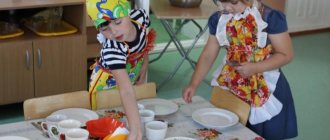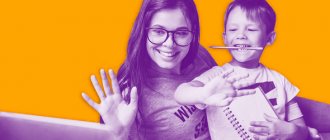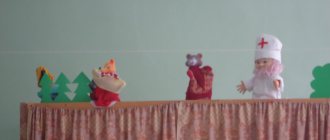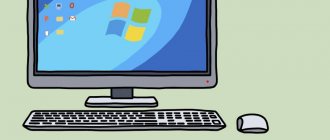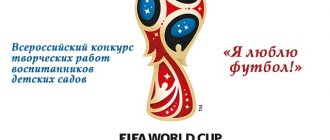MAGAZINE Preschooler.RF
Pedagogical Council “Preservation and strengthening of the physical and mental health of preschool children through the formation of their ideas about a healthy lifestyle”State budgetary preschool educational institution kindergarten No. 1 of the Kolpinsky district of St. Petersburg
Compiled by: senior teacher Shumakova G. A. GBDOU d/s No. 1 November 2014
The purpose of the teachers' council:
- Systematize teachers’ knowledge on this topic.
- Learn to analyze and evaluate the activities of colleagues.
- Strengthen the ability to form pedagogical conclusions based on factual material.
Date of the teachers' meeting: November 25, 2014.
Preparing for the teachers' meeting.
1. Studying methodological literature:
- Zimonina V.N. “Raising a preschool child: developed, organized, independent, proactive, not ill, communicative, neat .
- “Growing Healthy” : Program. -method. manual for preschool teachers. education institutions.
- Doskin V.A. “Growing up healthy” : A manual for educators, parents and physical education instructors.
- Bogina T.L. "Children's health protection in preschool institutions" . Toolkit.
- Program “Basics of a healthy lifestyle” Part 1 Methodological recommendations for preschool institutions.
- Doman G. and D., Hagi B. “How to make a child physically perfect .
- Kartushina M.Yu. “Scenarios of recreational activities for children 4-5 years old” .
- Kartushina M.Yu. "Scenarios of recreational activities for children 6-7 years old" .
- Penzulaeva L.I. "Recreational gymnastics for preschool children (3-7 years old)" .
- Kartushina M.Yu. “Green light of health. Senior group" : Methodological manual for teachers of preschool educational institutions.
- Kartushina M.Yu. . ” Health-improving and educational activities for children in the kindergarten preparatory group.
- T.I. Osokin “Physical education in kindergarten” . "Children's games and entertainment in the open air" .
- “Organization of active recreation in kindergarten” d/v No. 10/07, p. 26; 2/02, p.12; 10/02, p.13; 3/03
- A.V. Keneman "Theory and methods of physical education of preschool children" .
- “How to raise a healthy child” according to the program by V.G. Alyamovskaya, d/v No. 11 2004, p. 8.
- "Physical education in the family".
- “Cultivating interest in physical education” , d/v 2/06, p.34.
- “Educational and health work” d/v No. 9/03, p. 23; 6/04, p.9; 10/04, p.9; 2/05, p.33.
- “An integrated approach to physical education” d/v “6/03, p.7; 3/09, p.37; 10/06, p.31; 11/06, p.14;, 2/07
- T.Veryasova “1, 2, 3, 4, 5 fingers came out for a walk .
- “Teaching children to communicate”.
2. Viewing open events and conducting practical classes with teachers and children:
- Practical lesson “I do gymnastics” (Kvitkova S. V.)
- Game activity with elements of finger gymnastics (Kolesova N. A.)
3. Preparation of consultations for teachers:
- “Effective forms of physical education and recreational work in preschool educational institutions” (Stanislavova M. V.)
- “Effective methods and techniques in carrying out physical education and recreational work in preschool educational institutions” (Kvitkova S. V.)
- “The use of non-traditional methods of healing in working with preschool children” (Timofeeva O. L.).
4. Thematic control on the topic of the teachers' council.
5. Diagnostics of children’s knowledge, skills and abilities in the section: “Physical education” .
6. Express – survey of teachers.
7. Questioning of parents.
Homework:
Making a folder - moving on the topic of the teachers' council.
Plan for the teachers' meeting:
- Implementation of the decision of the previous teachers' council.
- Opening speech by the head of the GBDOU Poshekhonova O.V. about the importance of improving the quality of physical education and recreational work in the preschool educational institution.
- — Analysis of the state of physical education and recreational work in preschool educational institutions.
(Results of thematic control) Shumakova G. A., senior preschool teacher.
— Results of the parent survey. Shumakova G. A., senior preschool teacher.
4. Speech by N. V. Khlopina “Ways to reduce morbidity and proper nutrition of preschool children .
5. Speech on the topic: “Effective forms of physical education and recreational work in preschool educational institutions . Stanislavova M.V., teacher.
6. Speech on the topic: “Effective methods and techniques in carrying out physical education and health work in preschool educational institutions” Kvitkova S. V., teacher.
7. Speech on the topic: “Unconventional methods of improving children’s health . Timofeeva O. L., teacher.
8. Pedagogical warm-up. Shumakova G. A., senior preschool teacher.
9. Miscellaneous: adoption of the main educational program of GBDOU d/s No. 1.
10. Draft decision of the pedagogical council.
Teachers' council rules:
- Answer questions on the topic briefly, competently, using pedagogical concepts.
- Make additions and suggestions briefly, clearly and convincingly.
- Follow the progress of speeches, highlight the main thing, analyze.
Progress of the teachers' council.
1. Implementation of the decision of the previous teachers' council.
Listened to: O. V. Poshekhonova, head of the State Budget Educational Institution “Kindergarten No. 1” . She said that at the previous teachers’ council the annual tasks for the 2014-2015 academic year were adopted. The tasks set in the annual plan are solved according to the plan.
Solution: Continue implementation of the annual plan to resolve the assigned tasks.
2.
- Opening speech by the head of the State Budget Educational Institution “Kindergarten No. 1” O. V. Poshekhonova about the importance of improving the quality of physical education and recreational work in the preschool educational institution.
The health of children is the future of the country. And health can only be determined by movement. “Movement is life,” as the great philosopher Aristotle said, “Nothing exhausts and weakens a person more than prolonged physical inactivity . And indeed it is. Physical education can give a child all this. Physical education is not only physical education classes, but a whole system of organizing the motor activity of children at home and in kindergarten. Physical exercise not only promotes optimal physical development, but also improves memory.
It’s not for nothing that A. Schwarzenegger says: “The main attention in children’s physical education should be focused on the development of motor skills. Running, jumping, throwing, grabbing with hands, kicking with legs - this is the ABC of movements. We have found that when children have these skills, physical fitness and sports become second nature. Most children have not yet mastered this, which is why they are so reluctant to move .
There is some truth in these words.
Developing motor skills is of great importance not only for sports or physical training. These skills are also necessary in such seemingly completely different activities as being a surgeon, flying an airplane, dancing, modeling, and auto racing. A person whose motor skills are not sufficiently developed is unlikely to be able to fully realize his desires in a wide range of human professions.
Before a child turns 6 years old, we must do everything in our power to ensure that the child masters a wide range of motor skills.
This is a necessary condition for building the foundation of a child’s life, which will provide him with the opportunity to play sports, and will open access to a wide variety of human activities, and simply allow him to enjoy strong, confident and dexterous movements of his own body.
- Analysis of methodological literature on this issue, selection of the most necessary and interesting, in which you can find a large number of methods and techniques for introducing physical education and health work into the educational process of preschool educational institutions.
Solution: use methodological literature on this issue in your work.
3. Analysis of the state of physical education and recreational work in preschool educational institutions.
Listened to: Shumakova G.A., senior teacher of a preschool educational institution, she introduced the teaching staff with a certificate of conducting a thematic inspection on the topic of the teachers' council.
/certificate attached/
Decision: accept the recommendations of the certificate.
4. Results of the parent survey.
Listened to: G. A. Shumakova, senior teacher. She introduced the teachers to the results of the survey and read out a report on this issue with recommendations (the report and questionnaires are attached).
Solution: Regularly conduct comprehensive training for parents on raising a physically healthy person.
5. Speech by senior nurse N.V. Khlopina “Ways to reduce morbidity and proper nutrition of preschool children” : “Prevention of diseases among kindergarten employees .
6. Speech on the topic: “Forms of physical education and recreational work in preschool educational institutions . Stanislavova M.V., teacher.
7. Speech on the topic: “Effective methods and techniques in carrying out physical education and health work in preschool educational institutions” Kvitkova S. V., physical education instructor.
8. Speech on the topic: “The use of non-traditional methods of healing in working with children . Teacher Timofeeva O. L.
9. Senior teacher Shumakova G. A. pedagogical game-quiz “Grow up healthy, baby!” .
"Pedagogical warm-up".
Tasks given:
- Name proverbs and sayings about sports, courage and bravery (5 pieces each)
Sample proverbs and sayings:
- He who dared sat on a horse. - He who dared was the first to ripen. - Fight loves courage! - Cheek brings success!
- He can put anyone in his belt. - Where there is courage, there is victory! - One for all and all for one! - Sport is not dangerous if you have courage!
“Take it together, it won’t be difficult.” “The strong jump, and the weak cry.” * Demonstrate Physical Minutes (2 pieces each) * Make riddles (5 pieces each)
Sample riddles:
- Tell me what iron ball
Pushed by a strongman with one hand? (core)
* I took two oak bars, two iron runners, I stuffed slats onto the bars - Give me snow! Ready... (sleigh).
* This is a bird - not a tit, Not an eagle or a cormorant, This is a small bird Called... (shuttlecock).
* There are no clouds on the horizon But an umbrella opened in the sky, A few minutes later It descended... (parachute).
* Downhill - horses. Uphill - pieces of wood. (skis)
* I have two horses that carry me through the water, and the water is hard, like stone. (skates).
* When spring takes its toll and the streams run ringing, I jump over it, or it jumps over me. (jump rope).
- What is it with Galochka? A thread on a stick. A stick in your hand, and a thread in the river (fishing rod)
* How many of you guys know what helps hardening and is always useful to us? (sun, air, water).
* My horse stands rooted to the spot, does not stomp his hooves (gymnastic horse).
- Recite poems about sports (2 pieces each)
Sample verses: We did exercises, Jumped and ran. Became tanned
Strong and brave. We rode down the hill in the winter, swam in the river in the summer, so that later we would get straight A’s.
The diary rang. Every day for us, guys, starts with exercise. Even on the gloomiest morning
Physical education makes us happy. And of course it is very important that everyone does exercises. For classes, as is known,
We need a hoop. It’s both beautiful and useful to do exercises with it. Let's jump over the jump rope
It's far along the path. Not even a ball could jump so high. We're doing exercises
We start in the morning. Let diseases fear us, Let them not come to us. To grow and harden
Not by the day, but by the hour, We need to do physical education, We need to do Pedagogical situations.
Example pedagogical situations:
- Eat now! And don’t leave anything on the plate,” mom insists. She gets very upset when her three-year-old daughter pushes away her plate of uneaten food.
“He eats very little, not like Igorek, he eats like adults!” - she sighs. Let him eat more, he will be healthier!
Is the mother right in believing that the child’s food volume should be no less than that of an adult? How much should a preschool child eat? What advice can you give to a mother?
- Six-year-old Vitalik justifies his lateness for dinner by saying that he is not hungry yet.
- But they called you home! - says mom. - Why didn’t you listen?
- So what? I’m not hungry yet, because they just gave me cookies.
In the evening, Vitalik cannot be rescued from his neighbor - a peer. More bickering:
- I do not want to sleep! It is too early!
Only the categorical intervention of the father forces the son to submit to parental demands. With tears and lamentations, hastily washed, Vitalik casually takes off his clothes and goes to bed. Doesn’t fall asleep for a long time, whines: “I told you I didn’t want to sleep!”
How can we explain Vitalik’s disobedience, his reluctance to eat and sleep on time? Is Vitalik accustomed to the regime? What kind of work will you do with Vitalik’s parents?
- Valya’s mother complains to the doctor that her daughter is often sick.
“It’s a little draughty, she starts coughing.” In winter, all children go sledding and skiing. Blush all over your cheek! And mine sits at home pale, with a runny nose. Why are some children not afraid of colds, but mine gets sick every now and then? Perhaps she is so weak by nature? They advise: you need to toughen up the child. And we have no time for hardening! Let the healthy be hardened!
Is the mother right? Is it possible to improve the health of a weakened child? How to convey this to mom?
- When Serezha's mom and dad work late, the boy remains in the care of his grandmother. She tries to keep her grandson from getting bored and allows him to watch all television programs. ( "Let the child have fun!" )
Bedtime comes, and Seryozha goes to bed with a scandal. Doesn't fall asleep for a long time, whines. Sleeps restlessly at night. This morning I had a hard time getting out of bed.
Dejected mood, ate poorly, capricious.
-Are you sick? - Grandma is worried. And before taking him to kindergarten, he takes Seryozha’s temperature and dresses him warmly, just in case.
The kindergarten doctor, having examined the child, said:
- The boy is healthy.
The grandmother is at a loss: what is the reason for Serezha’s health?
What is the reason for Serezha’s decreased tone? What television programs can a preschool child watch? How much time can a child spend watching TV? Explain why.
"The Grammar of Fantasy"
Imagine that you:
- ball and sneaker – your dialogue
- racket and shuttlecock - your dialogue.
The jury assigns points.
10. Discussion and adoption of the main educational program of GBDOU d/s No. 1.
Decision of the pedagogical council.
1. Direct all the work of the teaching staff towards strengthening the health of children and reducing morbidity through the inclusion of effective forms of physical education and recreational work.
Duration: permanent
Responsible: all teachers.
- To expand the practice of using non-traditional methods of healing by updating the educational process in preschool educational institutions.
Duration: permanent
Responsible: all teachers.
- Replenish physical education corners with non-traditional equipment,
Use them constantly at work.
Duration: permanent
Responsible: all teachers.
- Organize consultations for parents to assist in raising a physically developed and healthy child interested in a healthy lifestyle.
Deadline: 01/01/2015
Responsible: all teachers
2. Adopt and implement the main educational program of GBDOU d/s No. 1 for a period of 5 years.
REFERENCE
on the results of the thematic inspection in the State Budgetary Educational Institution d/s No. 1
on the topic of:
“A system of work to preserve and strengthen the physical and mental health of preschool children through the formation of their ideas about a healthy lifestyle: physical activity of children in the daily routine of a preschool institution”
According to the work plan of the State Budget Educational Institution “Kindergarten No. 1” for the 2014–2015 academic year, a commission consisting of:
- Poshekhonova O.V., Head of the State Budgetary Educational Institution “Kindergarten No. 1”
- Shumakova G. A., senior teacher of the State Budgetary Educational Institution “Kindergarten No. 1”
- Khlopina N.V., head nurse
from 10.11.2014 to 21.11.2014 a thematic
check “Motor activity of children in a preschool setting in the State Budget Educational Institution “Kindergarten No. 1” .
Purpose: Analysis of the system of work to ensure children’s physical activity in various types of activities during the day of a preschool educational institution.
Control plan
| Next > |

